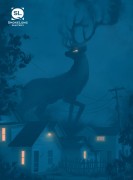I was out of the military for nearly four years before I could write anything coherent about my experiences. Until that point, my words amounted to little more than rants. How has it been since you got out? Have you needed a decompression period, or were you able to get to work right away?
When I got out of the Army, I had a strong urge to write, but it was more exploitative. I was thinking of my experiences in the infantry as material for stories, not as morally consequential threats to my future health and wellness. I was still convinced combat was a kind of spiritual, even literary, rite of passage. I made the sacrifice expected of me and was ready to receive my reward, so to speak. That was the story, the myth, I was raised to believe: the Biblical myth of good vs. evil, the myth of Divine Right that fueled the conquest of the so-called “New World,” the myth of Manifest Destiny that remains an operative disposition of U.S. patriotism and intervention, the myth that formed my identity and presented war to me as a kind of irresistible fate.
It wasn’t until I became a threat to myself after being home for a few years that I realized I needed a new story and began writing with a different sense of purpose and urgency. The Things They Carried by Tim O’Brien was instrumental in reshaping how I thought of my military experience, of storytelling, and of the life-saving, beauty-making work writing can do. I think of writing now as a process of unwriting the stories and myths I was conditioned to believe about the world and myself.
Can you tell us more about where these characters Dawes and Marquez come from? Do they embody any of the real soldiers you served with?
Dawes is an amalgam of soldiers and moments I remember from that patrol. I initially wrote this piece in the first person, but discovered it resonated more when I let go of “I” and allowed Marquez to take over. Maybe it sounds a little woozy, but where I have substituted fact for fiction it has been in service of the truth I have cultivated since. In that only I can forgive myself for my decisions, writing has become a kind of penance and Marquez a guiding saint.
What is the role of military jargon in war writing? “Mother of God” is pretty light on all the acronyms, ranks, and the military terminology that permeates a lot of other contemporary work. Why this approach?
I guess all that language just feels like baggage to me, stuff I don’t carry around anymore. It’s a layer I shed with the uniform. My Army buddies and I will throw around brevity-codes now and then, but in terms of writing, I think it can feel a little exclusionary. Either that or it can bog the narrative down with explanations. You remember the acronym KISS? Case in point.
How do the responsibilities of veterans and civilians differ when it comes to writing about war or the military? Is there a difference at all?
Half of this question is probably above my pay-grade. I can’t tell anyone else what they should be writing about in terms of war or the military. However, there is something precarious about aestheticizing violence or writing a “war story” if it’s meant to defend or celebrate ethnocentric warrior myths. My responsibility is to myself, that I write from a genuine conviction to examine and disarm those myths in my thoughts and actions, to find traction in friction and move forward.
If contemporary war stories are just platforms for expressing mere antiwar sentiment to readers of literary fiction, then writers are just preaching to the choir. That can’t be the case, can it? What do you think war stories are really about?
Most forums serve as echo chambers to a degree, I suppose. If a story is not in some way problematizing an ideology that compulsively pursues and profits from war, then it’s likely just propaganda used to justify state-sanctioned murder around the world and valorize the poor souls who carry it out. You can find these stories on the bestsellers shelf next to the exit of any corporate book store.
It’s easy to forget we are living in stories, narratives that have been told and retold so many times we are unconscious of their presence and influence in our lives. They become myths. Myths become identity. We forget that myths are human inventions that we are born into and confined by their limitations. Some are vital to our survival. Others are not. We make decisions from within the limitations of those myths, and by the time we recognize them as such it’s very often too late.
It seems to me all war stories are too late—much like the sudden, heart-shattering realization that beauty and loss are one. And yet they may be the only hope for their authors. Who’s to say? It’s a dilemma, I guess. I know a myth still slithers around in my body, whispering sweet nothings about power and possession, about war and destiny. It is the trauma of having acted in that myth that allows me to recognize it as a voice that is separate from my own. It’s just a voice, someone else’s voice. Someone else’s story. It will always be too late for some things, but if I wasn’t writing myself out of that story, it would be too late for everything else.



 The core workshop of SmokeLong Fitness is all in writing, so you can take part from anywhere at anytime. We are excited about creating a supportive, consistent and structured environment for flash writers to work on their craft in a community. We are thrilled and proud to say that our workshop participants have won, placed, or been listed in every major flash competition. Community works.
The core workshop of SmokeLong Fitness is all in writing, so you can take part from anywhere at anytime. We are excited about creating a supportive, consistent and structured environment for flash writers to work on their craft in a community. We are thrilled and proud to say that our workshop participants have won, placed, or been listed in every major flash competition. Community works.